DC’s Taxi System Hikes Fees, Frustrations
The price of a DC cab ride went up big time recently and neither riders nor cabbies are happy.
The price of a DC cab ride went up big time recently and neither riders nor cabbies are happy.
I discovered the fare hike this morning when a ride from my office to an appearance on Fox Live that previously set me back an even $10 with generous tip was suddenly that much outright. Wondering what the deal was–the driver hadn’t taken a particularly circuitous route–I learned that prices had gone up, rather dramatically, over the weekend.
The Washington Post (“D.C. taxi fare hike starts Saturday“):
Whether taking a cab to the Hill or past the Beltway, residents and visitors alike may be surprised to find that their wallets are a little lighter.
Beginning Saturday, the taxi mileage rate will increase to $2.16 per mile from $1.50. Taxis will still charge a base fare of $3.
Some cabdrivers said they are concerned that the new D.C. Taxicab Commission regulations will affect not their profits but their passengers. John, a driver who asked to remain anonymous to protect his job, said the fare increase takes away the incentive for picking up large groups of passengers or those with suitcases.
Under the new regulations, a $1-per-passenger fee may be charged for the second, third and fourth members of a group riding in a van. The maximum additional passenger fee is $3 per trip, which John said would leave groups of five or six customers on the curb.
The folks at WTOP did the math: “Taxi fares in DC going up by 44 percent.”
So, the average cab user–a single individual hopping across town without any luggage–will pay substantially more but cabbies fear losing money on groups and those with suitcases.
Not surprisingly, people are bitching. Liz Essley for The Examiner (“Cab fares up, bad service unchanged“):
Taxi rates in the District jumped two weeks ago from $1.50 a mile to $2.16, but the improvements in service that business leaders and others thought cabbies should provide in exchange for the higher fees — including GPS navigation, credit card payments and newer vehicles — won’t be seen for many months, if ever.
And that’s frustrating riders.
“The people I talk to are taking more public transit, are no longer tipping or are taking Uber [a town car service],” said Jack Jacobson, spokesman for consumer watchdog DC Taxi Watch.
[…]
D.C. workers and residents downtown and in Dupont Circle on Wednesday were annoyed or ambivalent about the fare hike, but they were uniformly impatient for better service.
“It’s terrible to get into a cab and have to tell them where to go,” said Larry Cirignano, who works near McPherson Square and accepts the higher fares given the current high prices for gas. “I’ve had multiple times they’ve taken me to the wrong quadrant. Or they don’t know where a Metro station is.”
District business leaders called on city officials to tie any fare increase to improved service by the city’s 8,000 cabs, including allowing credit card payments, requiring better driver training and forcing older cabs out of service. They cited complaints about drivers who were unfamiliar with city streets or surly and cabs that are dirty or on the verge of breaking down.
But the D.C. Council won’t take up legislation mandating better service until the end of this year. And a separate proposal to get rid of any cabs older than five years is still in the works.
The DC cabs are atrocious by the standards of other major cities is a widespread view.
PostLocal’s Petula Dvorak titled her column “D.C.’s taxis: Third-class rides in a world-class city just got pricier.”
We’ve got cheeky, red bikes zipping across the region. One of cleanest Metro systems around. Super-cute Smart Cars scattered across town that you can rent by the minute with the swipe of a card. And buses that crisscross the city.
Short of a monorail or molecular transporters, the D.C. area is looking pretty modern on the public transportation front, pedicabs aside.
That’s why it’s just kind of fun sometimes to take a cab, when I’m yearning for a trip to Cairo or wanting to relive the memories of a harrowing afternoon in rural China.
D.C. taxis are there to give you that developing world experience.
Uncertain pay rates, rude drivers dodging through traffic with lots of dubious twists and turns, the drone of an incessant phone conversation that you’re not part of, the smells of a pungent lunch filling the hot cab.
Having lived most of my life in the suburbs and therefore driving myself most places, I don’t spend much time in cabs. But I have taken taxis all over the world, in first world and third world cities, and DC has the worst quality vehicles in their cab fleet that I’ve encountered–certainly when adjusted for the median local non-taxi automobile on the road. I’ve generally found the cabbies to be friendly and the vehicles non-smelly but, yes, they do seem to have brought third world driving craziness with them. And for someone habituated to driving in the DC Metro area to notice how crazy the driving requires some doing. And, yes, too many of them do so while yapping on their cell phones–usually via bluetooth.
DCist (“Unfare? D.C. Taxicab Commission Approves Fare Hikes, Will Go Into Effect By May“) piles on, leading off with, “Those mediocre D.C. cab rides just got a little more expensive.”
On the other hand, as Dvorak acknowledges, the new rates still put DC in the national median.
Now granted, D.C. taxis were probably too cheap at one time. Compare us with 39 other cities on cab fares and you’ll see we used to be the cheapest. Now we are somewhere in the middle, less expensive than Honolulu but significantly pricier than Cincinnati.
Further, as TBD reports (“Unhappiness abounds as D.C. taxis raise fares and face modernization“), cabbies are feeling squeezed.
D.C. residents may not be thrilled with the fare increases slowly taking effect throughout the District’s taxicab drivers but neither are the drivers — the 8,250 local taxi drivers are growing increasingly frustrated with both how the modernization initiatives are unfolding and the fight to make a living.
“We are asking them to abide by the law, to be fair,” said Haimanot Bizuayehu of the Small Business Association of D.C. Taxicab Drivers.
Bizuayehu told me that driver income has fallen by around a third over the last four years. He questions whether the new fares will even help. The per-mile taxicab rate may have risen from $1.50 to $2.16, he says, but the way the Commission shifted other fees creates a situation where drivers will still fight to earn a living. The D.C. Taxicab Commission acknowledges a drop in driver income of at least 20-30% in income from the conversion from a zoned to metered system in recent years.
Forcing cabbies to have state-of-the art vehicles, complete with GPS navigation systems and credit card machines, will either require substantial fare increases or come out of the hide of cabbies. Neither option is good. Oh, and cabbies are already having to pay steep fees to get their meters certified on a regular basis. And I’m guessing a lot of riders, accustomed to paying a given rate for a trip they take with some regularity, are tipping less, too.
DC is simply a hard town to get around. The subways are pretty good–by subway standards, at least–during peak periods but large swaths of the city have no Metro access. Off peak, the wait times can be absurd. The buses are, well, buses. Driving oneself from point to point is not only prohibitively time consuming but parking in many parts of town during the day is either impossible or outrageously expensive. Which is why I tend to park my car in the parking garage by the office and either walk or cab it for business in town during the day. And, well, cabbing just got more expensive.
It’s frustrating. Then again, I don’t know whether the situation is substantially better in other comparable metropolitan areas. I’ve been to more than my fair share but only as a short-term visitor. How much of this is a function of the legendary incompetence of DC government, how much is a vestige of DC’s bizarre tax and regulatory structure that comes with being a creature of Congress, and how much is just the unavoidable infrastructure issues that come with a teeming city is beyond my expertise.
An only tangentially related aside: the DC cab system was the ostensible subject of a truly awful 1983 movie starring Mr. T, Adam Baldwin, Bill Maher, and others.
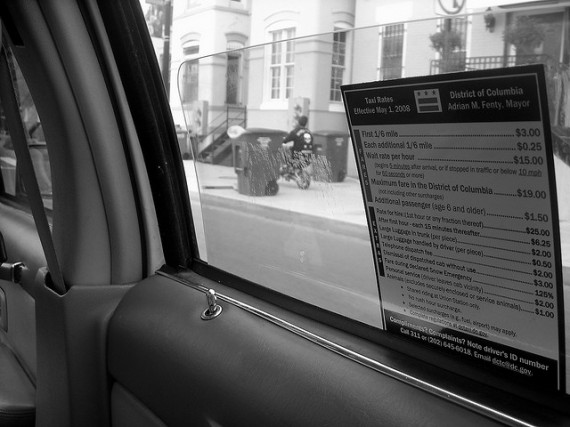

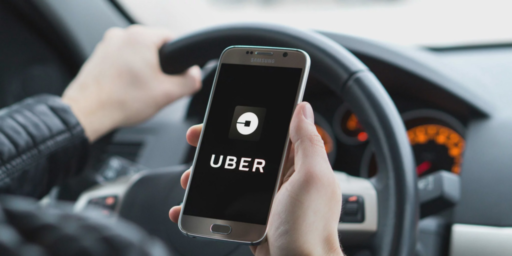
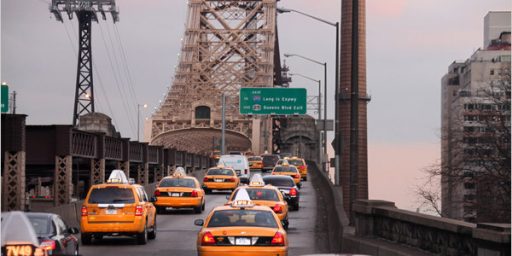

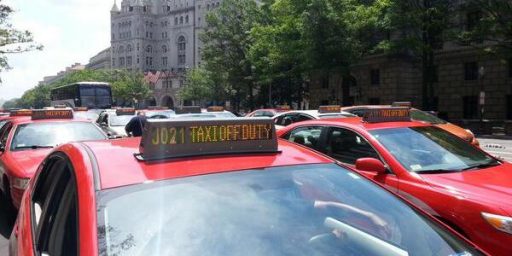
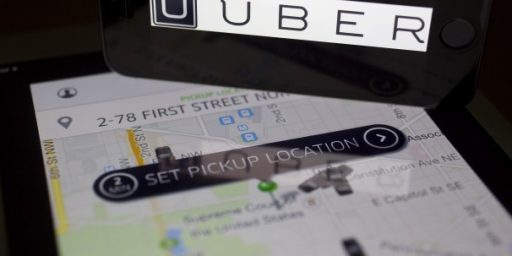
DC cabs are miles behind northern Virginia cabs, and I’m not really sure why. The Red Top cab company operating in VA is reliable, clean and easy to reserve. In DC, it’s the opposite.
It would be interesting to see what gasoline cost when the previous rates were set.
However one can’t argue that when compared with other areas and cost of living is included in the equation the old DC cab rates were too low.
@Davebo: Oddly, there’s a flat $1 “fuel surcharge” added to every fare. It expires every 3 months or so and then gets renewed.
Can we file this entry under “Things No One But James Cares About”?
This whole post was just so you’d have an excuse to plug your TV appearance, wasn’t it? ;>
@Moderate Mom: Well, few people outside DC, anyway. But they comprise a significant portion of my readership and the headline doesn’t exactly disguise the nature of the post.
@Stormy Dragon: Nah, I’m on enough that I typically don’t even post notices anymore.
This problem @Moderate Mom: I have wondered why things like this and Game of Thrones have been posted while absolutely no one seems interested that Europe is entering a full-blown depression. But then I remind myself it’s a blog about what is of current interest to the bloggers, and it all makes sense.
@Ben Wolf: I have no idea why This problem appeared in my previous post, as I didn’t type it.
@Ben Wolf: Or maybe I did. I am now officially drunk for the first time in five years.
Yes but it’s a cab, so you know you’re going to pay more than you like.
Somebody (usually an immigrant here in the Bay Area, or in NYC and probably DC too) is trying to make a living. So, unless the cab is not clean or the driver is rude, I don’t complain.
I don’t spend nearly as much time in D.C. as James does but I’ve got to agree with pretty much every frustration voiced about the cabs in D.C. Not only is the fleet hopelessly antiquated compared to, say, the cabs in Northern Virginia, but they don’t even hold candle to what you’ll find in a real modern city like Chicago or New York.
Perhaps the most frustrating thing about a D.C. cab, unlike any cab I’ve encountered in an American city in the past 5 years at least, is the fact that they’re not set up to take credit cards for fares. That is perhaps the one complaint I hear most often from out-of-towners who make the mistake of taking a cab in D.C.
Of course, there really aren’t many other options. Metro is a pathetic joke during non-rush hour and not that much better during rush hour. And the bus drivers seem to be holding a contest amongst themselves to see who can cause the most injuries in a given year.
This is but one of the reasons that D.C. will never be a world-class city no matter how much it pretends to be.
@Ben Wolf: There were tons and tons of postings here about the Euro crisis months back. I’ve stopped writing about it even at New Atlanticist, though, because I’ve simply run out of things to say.
Want to hear a crazy story? I once saw a D.C. cab driver use his turn signal.
Just kidding, that never happened.
@Doug Mataconis:
In my travels, I think NYC is the best place in America to get a taxi, period.
Good vehicles, debit or credit cards, I’ve never had a problem with a taxi in NYC and that includes trips out of Manhattan over to Brooklyn or up to the Bronx, or to the various regional airports.
@James Joyner: That was my point: while the Eurozone is of paramount importance to me, it isn’t something to which you devote much time or have all that large an interest in. Your blog is about what interests you and it’s unfair to criticize the bloggers for that. One just needs to step back and acknowledge not everyone cares about the same things in the same way.
@Ben Wolf:
Well that’s generally what blogging is about, as you noted.
There’s another thing that blogging generally is as well, though, and that is that it’s driven in large part by what’s in the news. The essence of blogging is linking and that becomes kind of hard to do when there’s not much of interest to link to. As far as the Euorzone goes, I agree that it’s an important story but we’re also at a point right now where it’s not exactly generating a lot of headlines, especially not here in the US. When it was several months ago, we did have several articles here about the problems going on there and how they might impact the US economy.
I’d also note that those Eurozone posts — indeed pretty much any post about foreign affairs that doesn’t involve an immediate international crisis — tended not to generate much in the way of comments, which is really the best way I have of figuring out if people are interested in a given topic.
In that regard, I’d just note that the posts that generated the most comments last month included Steven Taylor’s post on the “gang attack” in Mobile, James Joyner’s post on what happened to “thoughtful conservatives,” and mine on John Derbyshire’s racist diatribe. Other such posts included ones on the Hillary Rosen/Ann Romney nonsense and Ted Nugent.
@Doug Mataconis: I completely agree. My original comment was directed at Moderate Mom’s criticism of James for blogging about something “only he cares about”. Perhaps my response wasn’t as well-worded as it should have been to get across that not everything on a blog can be of broad interest. The things I find most fascinating are incredibly boring to most people, which is why threads usually go quiescent when a few of us get into technical discussions.
@Moderate Mom: Yes.
BTW, while I did link to the Post article, I never did find the chart comparing DC with 39 other metropoli. That would have been interesting to me as the last time I took a taxi (we don’t call them “cabs” in Korea–ever!) in the US, the fare from West Seattle to the Amtrac station (about a 10 minute drive at 6 a.m.) was $25.00 before the tip. That was in 2001 or so.
In Korea, a typical taxi trip runs 3-6000 won–roughly $2.50 – 5.35 at current exchange rates. Distances here are much shorter, however. Most places I take a taxi to, I could walk to in about 20 minutes.
A few thoughts struck me:
Will Marion Berry tackle this after he cleans up the “dirty Asian shops” that plague DC?
Was DC ever intended and designed for a large residential population?
Is it really the government’s place to regulate cabs to the point of dictating fares?